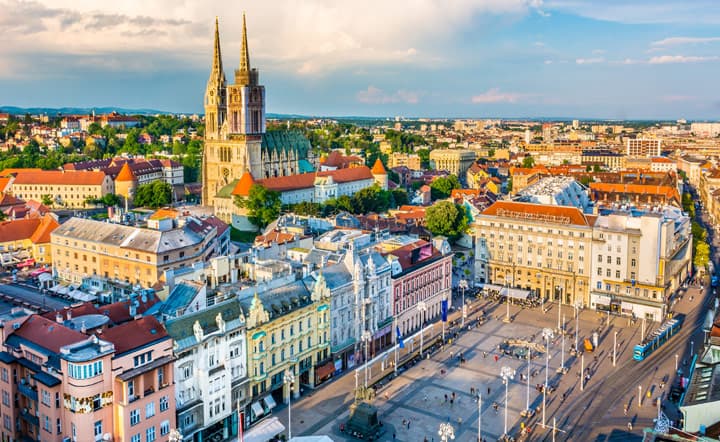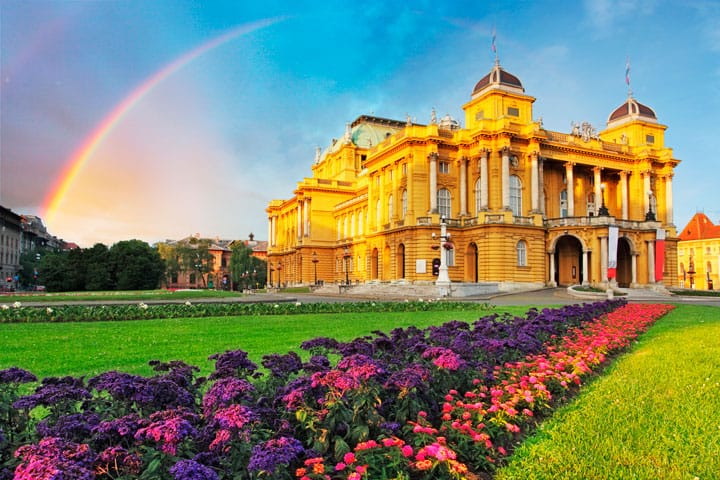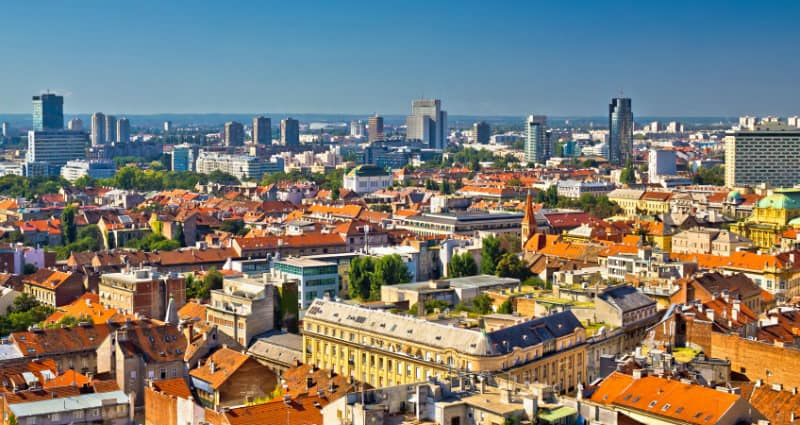
Gay Zagreb · City Guide
First time in Zagreb? Then our gay Zagreb city guide page is for you.
Book A Travel Gay Approved Hotel

Zagreb
Croatia's largest city and the only metropolitan area of more than one million people. Zagreb has a rich history that dates back to Roman times. The last 100 years have been quite turbulent with World War 2 and the Croatian War of Independence bringing conflict to the city.
Nowadays, Zagreb is a bustling metropolis and cultural hub with a vibrant cafe culture, interesting museums, great shopping opportunities and architecture reflective of its medieval and communist past.
Gay Rights in Croatia
Same-sex sexual activity has been legal in Croatia since 1977 and discrimination is banned on the grounds of sexual orientation, gender identity and gender expression.
Croats can be quite conservative and a 2013 referendum on the definition of marriage saw 66% vote in favour of marriage being defined as that between a man and a woman. The Life Partnership Act of 2014 offers almost the same rights as marriage, minus adoption.
Pride parades are held in most major city in Croatia with Zagreb Pride being the largest event, held every June since 2002.
Gay Scene
As with a lot of Eastern Europe, Croatia is socially quite Conservative, so it's advised to keep overt displays of affection to a minimum.
Zagreb has a modest gay scene that is a lot more subtle than in your face Berlin and Madrid. It does not have a gay area as such but most venues are within easy walking distance of each other.
 Croatian National Theatre
Croatian National Theatre
Getting to Zagreb
By Air
Zagreb Airport (ZAG) is the largest airport in Croatia and is well connected to most of Europe. It offers a few flights to the Middle East as well as a seasonal service to Toronto.
A shuttle bus from the airport takes you to the main bus station. Journey time is around the 30 minute mark and services are organised by each scheduled flight arriving. Singles cost 30 HRK. Buses run from 7am to 8pm.
A taxi will cost at least 150 HRK, with extras charged for luggage. The journey time into central Zagreb is around 30 minutes.
By Rail
Zagreb train station has connections throughout the Balkans and Central Europe. The building itself is an impressive feat of Hungarian architecture.
Getting around Zagreb
On Foot
Zagreb is a compact city and you shouldn't have any problem getting around on foot. It's also a good way to get a feel for the city and take in the sights.
By Tram and Bus
Zagreb has a reliable public transport network with 15 tram lines across the city. Full service is from 4am to midnight and there is a night service on 4 lines.
Singles during the day cost 10 HKR (going up to 15 HKR at night) and day tickets cost 30 HKR. Please remember to validate your ticket.
By Taxi
Taxis are readily available but obviously be wary of unregistered cabs. Taxis from outside the bus and train stations are often more expensive so it may be worthwhile to walk a bit before flagging one.
Where to Stay in Zagreb
We recommend staying within the city centre. For our list of recommended Zagreb hotels, visit our Gay Zagreb Hotels page.
Things to See & Do
Museum of Broken Relationships - don't let the name put you off, this is a surprisingly poignant and totally unique museum filled with artefacts that symbolise failed relationships.
St Mark's Church - impressive Serbian Orthodox Church that despite it's medieval looking appearance was constructed between 1931-1940.
Ban Jelačić Square - Zagreb's main square and bustling hub of life. Perfect for people watching.
Croatian Museum of Naïve Art - a museum dedicated to Croatian Naive artists of the 20th Century.
Zagreb Cathedral - huge neo-gothic catholic cathedral built in the 12th Century.
Zagreb City Museum - established in 1907, this museum documents and charts Zagreb's turbulent past

When to Visit
Zagreb tends to fluctuate between both sides of the weather spectrum. The cold winters are unforgiving and summers are sweltering. May-June are when the weather is most pleasant.
Visa
Croatia is not within the Schengen Zone but is part of the European Union. Its visa requirements fall in line with what you would expect from most EU states.
Money
The currency in Croatia is the Kuna (HRK). Some stores, restaurants and hotels accept payments in euros but the exchange rate may not be very good. We'd advise against paying with Euros
Cash dispensers are widely available. Credit and debit cards are widely accepted.
Join the Travel Gay Newsletter
Have we got something wrong?
Are we missing a new venue or has a business closed? Or has something changed and we have not yet updated our pages? Please use this form to let us know. We really appreciate your feedback.